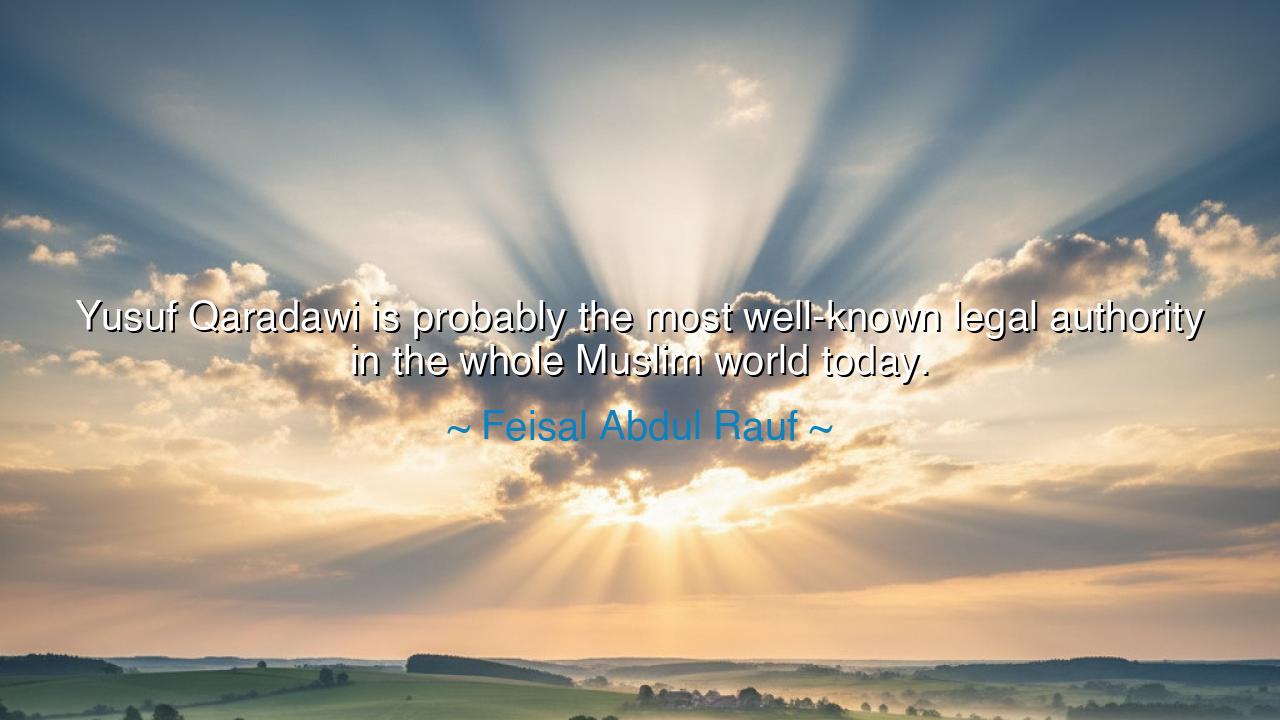
Yusuf Qaradawi is probably the most well-known legal authority in
Yusuf Qaradawi is probably the most well-known legal authority in the whole Muslim world today.






There are times in history when a single scholar becomes the living voice of an entire civilization’s conscience — a bridge between divine law and the human struggle to live by it. In this spirit, Feisal Abdul Rauf, an imam known for his efforts to build understanding between Islam and the modern world, once said: “Yusuf Qaradawi is probably the most well-known legal authority in the whole Muslim world today.” His words were not uttered in flattery, but in recognition of a man whose influence had reached across continents, languages, and generations. To call one “the most well-known legal authority” is to acknowledge not only scholarship, but the immense moral responsibility that comes with guiding hearts through the complexities of faith and modernity.
The origin of this quote lies in the realm of contemporary Islamic thought. Yusuf al-Qaradawi, an Egyptian-born cleric and jurist, became one of the most visible and controversial figures in modern Islam. Through his writings, sermons, and legal opinions — or fatwas — he sought to reconcile the ancient principles of Sharia with the shifting realities of the modern world. Feisal Abdul Rauf, himself a man of dialogue and moderation, spoke these words in recognition of Qaradawi’s prominence. Whether praised or criticized, Qaradawi was undeniably a towering figure — one whose legal interpretations shaped debates in mosques, universities, and governments across the Muslim world. Abdul Rauf’s statement thus stands as both acknowledgment and reflection: a testament to the power of one mind to influence the moral direction of millions.
To understand the weight of such authority, one must first understand the tradition it emerges from. In Islam, the jurist — or faqih — is not merely a lawyer interpreting laws. He is a guardian of meaning, a seeker who strives to translate the eternal will of God into the changing conditions of human society. From the early centuries of Islam, figures like Imam al-Shafi’i and Imam Malik forged the frameworks that govern Islamic law to this day. Their legacy was not mere jurisprudence, but balance — a balance between divine text and human reason, between revelation and reality. When Abdul Rauf speaks of Qaradawi as the most well-known legal authority, he places him, consciously or not, in that ancient lineage — the chain of scholars who strive to make the timeless relevant, and the sacred accessible.
Yet fame in matters of law and faith is a double-edged sword. Like the ancient philosopher Socrates, who guided Athens through the moral questions of his time, Qaradawi became both revered and condemned. His influence extended through television broadcasts and written works, reaching millions who sought guidance on how to live faithfully amid modern complexity. Some viewed him as a reformer, others as a conservative voice defending tradition. But in either case, he represented the living tension within Islamic jurisprudence — the constant dialogue between the eternal and the evolving. Feisal Abdul Rauf’s observation, therefore, is not mere description; it is a mirror held up to the Muslim world itself, reflecting its struggles to navigate change without losing its core.
In every civilization, there arises such a figure — a teacher who stands at the crossroads between past and future. The medieval Christian world had Thomas Aquinas, who labored to reconcile reason and revelation. The Jewish tradition had Maimonides, who united faith with philosophy. In the modern Muslim world, Qaradawi occupied that same precarious space. His prominence was not born merely of authority, but of accessibility. He spoke to the ordinary believer, addressing the moral dilemmas of daily life — how to conduct business ethically, how to practice faith amid globalization, how to remain true while the world changes around you. In this, Abdul Rauf’s statement recognizes a truth beyond one man: that leadership in faith is not about power, but about interpretation, and that those who interpret the sacred carry an immense burden.
But greatness in the realm of ideas is not without peril. History teaches that the more visible a scholar becomes, the more his words are weighed, dissected, and often distorted. The same voice that brings clarity can also invite division. Thus, Abdul Rauf’s quote can be read as both recognition and caution — a reminder that fame in spiritual matters must always be accompanied by humility. The jurist, like the prophet, must remember that his task is not to dominate, but to serve; not to command, but to clarify. For when legal authority becomes divorced from compassion, law turns into mere rigidity; and when compassion loses its anchor in law, it drifts into chaos.
Let this be the lesson to all who read and reflect: true authority lies not in being known, but in being rightfully guided. To wield influence over hearts and minds is to carry the heaviest of burdens — the responsibility to interpret justice with mercy, and to unite rather than divide. Feisal Abdul Rauf’s acknowledgment of Qaradawi’s prominence is, therefore, more than commentary; it is a call to remember what such prominence means. For in every age, the scholar must choose between pride and service, between fame and truth. And those who follow must learn not to worship personalities, but to seek the wisdom within their words.
Thus, as the ancients taught, the greatness of a teacher is not in how many followers he gains, but in how many souls he elevates toward understanding. Knowledge is a light, but it burns those who carry it without reverence. Let every generation, therefore, honor its teachers not for their fame, but for their fidelity — and let every teacher remember that to be a “legal authority” is to stand between God and His creation, as both servant and steward of truth.






AAdministratorAdministrator
Welcome, honored guests. Please leave a comment, we will respond soon